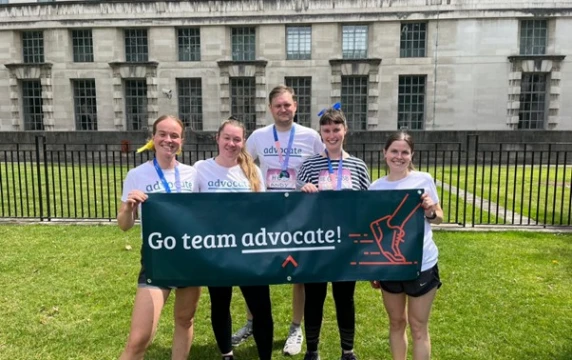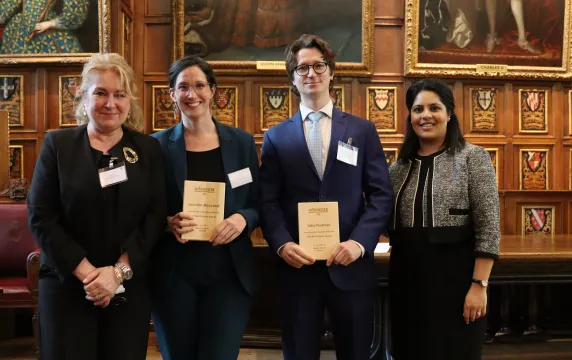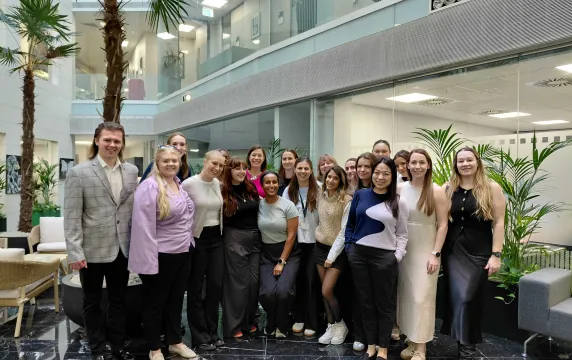Jagoda Klimowicz, of Brick Court Chambers, has received mentoring on an Advocate case, from Sebastian Naughton of Serjeants’ Inn Chambers, through Advocate’s case-based mentoring scheme, Collaborate. Here they speak of their experience of mentoring and working pro bono more generally.
 Jagoda Klimowicz
Jagoda Klimowicz
What made you take on pro bono work?
I wanted to get on my feet – my normal practice involves judicial reviews and high value commercial cases where I am usually led. I really enjoy it, but it gives me less opportunity to develop my own oral advocacy skills.
What has been your experience of pro bono work?
It’s been great! I enjoy the challenge of practising in a new area of law, and it is so rewarding to make a difference to someone who would otherwise have been unrepresented. Many of Advocate’s cases are very meritorious and I am confident that judges would see that with or without representation, but by being there you give the litigant in person more confidence in their case and ability to navigate a complex system.
How was your experience of being mentored?
My mentor has been super helpful. As someone without any previous experience in the Employment Tribunal, I had very little knowledge of the practicalities, so it was useful to be put in touch with an experienced employment practitioner who could give the answers you won’t find in textbooks. It is also nice to have someone to bounce ideas with and have the reassurance that you are on the right track.
Would you recommend receiving mentoring through Collaborate?
Yes, definitely!
 Sebastian Naughton
Sebastian Naughton
Has pro bono work always been a part of your career, and if so, why?
Pro bono work has always been a part of my career, although there is always room for improvement. At the start of my career, I took my first advocacy steps in Social Security Appeal Tribunal hearings and employment tribunals, all through and with the assistance of the Free Representation Unit (FRU), of which I became Chair of the Management Committee for a year between 2000-2001. Thereafter I acted in the occasional pro bono case over the years and became an Advocate Reviewer in 2014. I have recently become a mentor. It is my personal belief that every lawyer has a social responsibility to undertake at least some pro bono work.
What effect has pro bono work had on your career?
In my early years it provided me with valuable experience and enabled me to “cut my teeth” with real clients. Latterly it has provided me with a sense of reward and purpose. It is good to feel like you are putting something back, and the need for pro bono assistance has never been greater in my career.
What made you want to become a mentor?
I have always marvelled at the collegiality of the bar, which seems to me as strong today as it was 20 years ago when I started out. Having the time (and, I hope, the expertise) to assist and guide junior practitioners undertaking pro bono work in other sets, some of which may not have that specialist experience was an opportunity I could not pass up. It has been both enjoyable and rewarding for me (and, frankly, not particularly time consuming or difficult).
Most of all, at a time when I am struggling to fit substantive pro-bono casework into my diary, it is a way of making pro bono work part of my practice by helping others to do the harder yards whilst I can help by advising on the route.
What has been your experience of mentoring through Collaborate?
So far, it has been excellent. From recollection I have acted as mentor on at least two occasions, and I hope it has been of assistance to those who I have spoken to. I have met some impressive and skilful junior barristers. I hope that I am providing assistance to those in need by helping their advocates avoid pitfalls that the un-seasoned practitioner cannot know about, with simple advice and encouragement after listening to their case analysis or procedural summary.
Would you recommend being a Collaborate mentor?
I would recommend becoming a Collaborate mentor, particularly to those who have experience as pupillage supervisors (or are considering this in future), those who may feel unable to take on the responsibility associated with casework, but who have sufficient time and expertise to help those who have taken up that challenge.
Senior barristers, if you are interested in becoming a Collaborate mentor and offering your expertise to support the junior Bar, you can find out more here and sign up here.
Junior barristers can register their interest in receiving mentoring when they take on a case with Advocate. When you confirm your assistance on an Advocate case, simply mention to our Casework Team that you are interested in receiving mentoring support. Our Team will then introduce you to your mentor via email.
If you are not already signed up as an Advocate volunteer, you can sign up here.







